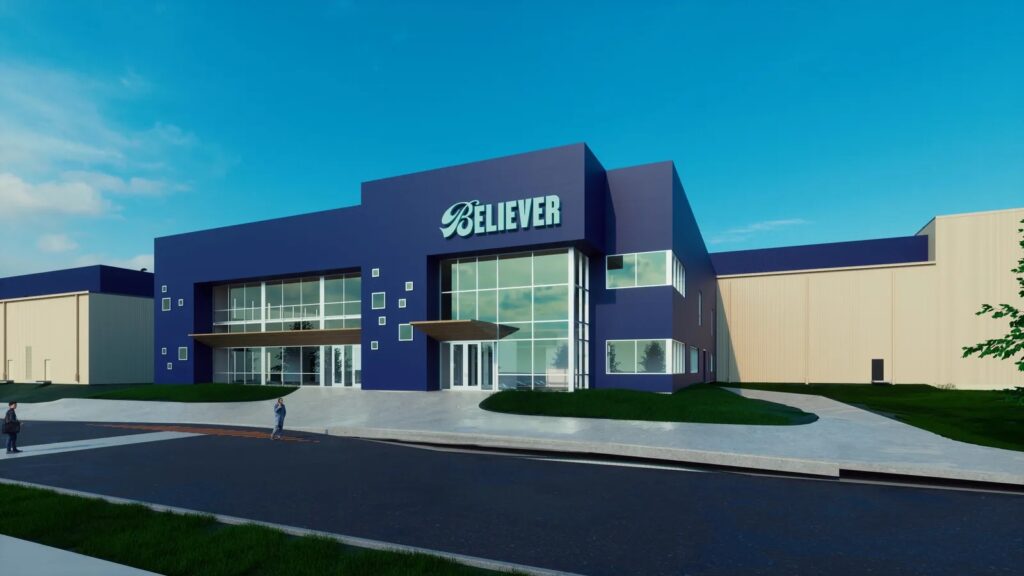
Israel’s Believer Meats has joined forces with German engineering firm GEA to help scale up production of cultivated meat, ahead of opening the industry’s largest facility next year.
Early next year, the world’s largest manufacturing facility for cultivated meat will open its doors in North Carolina. Its owner, Israeli startup Believer Meats, is already planning ahead to optimise its processes in the long run.
The company has partnered with German corporation GEA – one of the biggest suppliers of production-scale equipment for the food and beverage sector – to develop technologies and processes that would drive down the costs and emissions associated with producing cultivated meat.
“Believer is on track to overcome the biggest obstacles to scalability,” said Believer Meats CEO Gustavo Burger. “By partnering with GEA – one of the world’s foremost engineering and biotech equipment manufacturers – we are taking the next step in innovating state-of-the-art technology and process engineering capabilities needed to produce cultivated meat products at the right cost.”
Climate and costs at the forefront

The collaboration aims to enhance the unit economics and sustainability aspects of cultivated meat by optimising the performance and efficiency of manufacturing, starting with chicken before expanding to other products.
Believer Meats and GEA will look to drive advancements in bioreactor technology, perfusion systems, and media rejuvenation. They will also adopt numerous strategies to lower the climate impact of producing cultivated meat, including optimised water usage, power consumption, and circular economy initiatives like waste stream utilisation.
GEA will develop and commission bioreactors for Believer Meat’s technology, specifically designed to deliver high cell densities and yields. The latter’s centrifuge-based perfusion and cell media rejuvenation process is said to optimise cell performance and save water, nutrients, and resources, allowing the startup to reduce production costs by eliminating byproducts and enabling the reuse of media.
“The partnership with GEA will help maximise production yields efficiently and sustainably, which are top priorities for Believer,” said Burger. “The cultivated meat industry is forging a new path that has never been travelled. We are thrilled to partner with GEA and are very optimistic about the future.”
The two companies will further seek to set up joint commercial ventures, leveraging each other’s strengths and resources to expand market reach and speed up the industry’s growth to full scale.
“With the global population expected to reach 10 billion by 2050, there is a clear need to feed more people using fewer resources,” said GEA CEO Stefan Klebert. “We share Believer’s vision that cell cultivation technology is the key to making safe, healthy meat broadly available and affordable.”
The deal comes just months after Believer Meats signed an MoU with Abu Dhabhi’s new food and water cluster, AgriFood Growth & Water Abundance, to establish research and production centres in the city in a bid to combat food and water insecurity.
Believer Meats study proves cheap cultivated meat possible

Believer Meats announced plans for its facility in late 2022. The 200,000 sq ft plant, located in Wilson County, North Carolina, will feature an innovation centre and tasting kitchen, and be able to churn out 12,000 tonnes of cultivated chicken every year. It’s expected to be operational at the beginning of 2025.
According to McKinsey, it will take until at least 2030 for cultivated meat to be cost-competitve with its conventional counterparts, and this is after companies have cut costs by 99% in less than a decade. One investor told Reuters that these products need to reach manufacturing costs of $2.92 per pound to breach price parity.
Believer Meats has already demonstrated the potential of its technology to lower the costs of producing cultivated chicken. Teaming up with researchers at the Hebrew University of Jerusalem, it showcased how using tangential flow filtration (TFF) – an efficient way to separate and purify biomolecules – can be an effective method for the continuous manufacturing of cultivated meat.
Inspired by how Ford’s automated assembly line transformed the auto industry in the early 20th century, their new bioreactor assembly method allowed biomass expansion of 130 billion cells per litre, with a yield of 43% weight per volume. This process of cultivating the chicken cells was carried out continuously for over 20 days, leading to daily harvests of the biomass.
The research, published in the Nature Food journal, suggested that this could bring down the cost of cultivated chicken to $6.20 per lb, in line with the retail price of conventional organic chicken.
“Our findings show that continuous manufacturing enables cultivated meat production at a fraction of current costs, without resorting to genetic modification or mega-factories,” said Believer Meats founder Yaakov Nahmias. “This technology brings us closer to making cultivated meat a viable and sustainable alternative to traditional animal farming.”
North Carolina, meanwhile, is also home to one of Bezos Earth Fund‘s Centers for Sustainable Protein. The alternative protein research hub at NC State University is primarily focused on biomanufacturing and commercialising new technologies – and counts Believer Meats as one of its industry partners.
The post Ahead of Opening World’s Largest Cultivated Meat Factory, Believer Meats Taps GEA to Drive Down Costs appeared first on Green Queen.
This post was originally published on Green Queen.